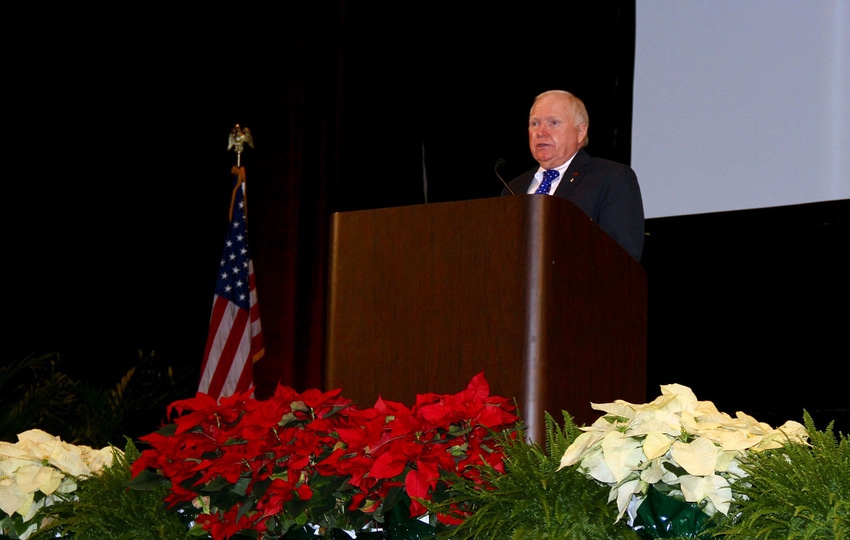December 30, 2019

Georgia farmers and agribusiness leaders from across the state met on Jekyll Island Dec. 8-10 for the 82nd annual Georgia Farm Bureau Convention. The three-day event included a trade show and educational sessions that briefed farmers on policy and production issues affecting Georgia’s major commodities.
GFB President Gerald Long delivered his annual address during the general session on Dec. 9. U.S. Rep. Buddy Carter (R-Dist. 1) and Georgia Agriculture Commissioner Gary Black also addressed convention attendees
(EDITOR'S NOTE: This story was edited for length.)
Farmers and small business owners have long struggled to obtain affordable health care. Long said the organization is now able to offer health insurance for small businesses with 50 employees or less and sole proprietors.
“For decades our members have asked for reasonably priced health insurance, but that goal was elusive. Now, through a partnership with Anthem, formerly Blue Cross/Blue Shield of Georgia, we can offer it,” Long said.
Farm Bureau’s motto has long been “The Voice of Georgia Farmers” as it has advocated for farmers in the legislative arena.
Long noted that Farm Bureau secured a victory in September for landowners when the U.S. Environmental Protection Agency and U.S. Army Corps of Engineers repealed the “Waters of the U.S. (WOTUS)” rule it first issued in 2015. Farm Bureau opposed the rule on grounds that it constituted regulatory overreach and deviated from two Supreme Court rulings in regard to defining federally regulated waterways versus waters that are solely under state authority.
“A new WOTUS rule is currently being developed which is more respectful of private property rights,” Long said.
GFB is currently working to ensure that Georgia farmers maintain the “Right to Farm,” as urban development moves into rural areas. “Right to Repair” is another issue GFB is addressing to secure the rights of farmers to work on farm equipment that has high-tech features.
Long also encouraged farmers and rural residents to educate all candidates running in 2020 elections about the issues that impact agriculture and rural Georgia.
“When the November 2020 election is upon us, all the candidates, whether they are Democrat or Republican, must have a strong understanding and appreciation for the importance of agriculture,” Long said. “That’s the challenge before us. We must educate these candidates before the election.”
Long also discussed three ways GFB is investing in Georgia agriculture. After Hurricane Michael, GFB created a Hurricane Michael Relief Fund that collected $665,000. In April, GFB distributed all of the donations to Georgia farmers who submitted applications demonstrating they suffered damages or losses that wouldn’t be covered by traditional disaster aid.
In 2018 and 2019, GFB has invested $150,000 in agricultural research addressing production issues Georgia farmers are facing on their farms. Long announced that GFB will invest another $125,000 in ag research in 2020.
The GFB Mobile Ag Classroom that Long announced at last year’s convention is in the process of being constructed and is expected to be unveiled at next year’s convention, Long said.
U.S. Rep. Buddy Carter (R-Dist.1) welcomed GFB members to his district and provided an update on action Congress has taken on key ag issues in the past year. Carter said he thinks changes the Department of Labor has proposed to the H-2A program will help farmers secure migrant workers they need to harvest their crops. Carter praised the DOL for converting the program from a paper system to online saying this will streamline the application and approval process for farmers trying to secure migrant workers.
“If a farmer is expecting three hundred workers and if Homeland Security suspects five of these employees, they currently hold up all of the workers,” Carter said. “This is the type of thing we’re expressing that we need help with, and I think we’re getting that message across.”
He said negotiations led by Sen. Marco Rubio of Florida were taking place to secure better provisions for fruit and vegetable growers under the United States-Mexico-Canada Agreement, which will replace the North American Free Trade Agreement. (USMCA was approved by the U.S. House Dec. 19.)
Carter also discussed his support of the Forest Recovery Act, which if passed, would amend U.S. tax code to give landowners who experience a loss of uncut timber due to natural disasters a tax deduction for their losses.
“Georgia is the number one forestry state in the nation,” Carter said. “The Forest Recovery Act will help forest owners who suffer a catastrophic event by assuring them they can get a tax deduction that takes the fair market value of the uncut timber into consideration.”
Per the proposed legislation, the tax deduction may not be less than the difference between the fair market value of uncut timber immediately before a loss occurs and the salvage value of the harvested timber.
Carter also discussed his work on the U.S. House Select Committee on Climate Crisis, established in January 2019 that is charged with delivering climate policy recommendations to Congress to achieve reductions in pollution and other activities that contribute to climate change.
“I wanted to bring a reasonable, rational, common sense approach to addressing climate change,” Carter said. “I have been a voice for the rural community and ag community.”
You May Also Like




